Diary of Anais Nin, Volume 5 Read online
Page 7
What I cannot bear is that to survive the destructiveness of others, we rebel, strike out, harm them, turn away. I wish I had been a saint.
Joaquin, who is a saint, writes me: "I tried to get close to him, and failed."
So many memories. Why did he build a wall around himself? Why did he always seek the flaws in others, why were his blue eyes so critical? No memory of tenderness or care, and yet my mother tells me that he took thousands of photographs of us, naked. He was full of aesthetic admiration for his children. It was the only moment in which he showed interest. Or was it interest in a new hobby, photography? I do not know. But the moment of photography was the only moment we received attention. I wonder if my dislike of photography came from that. Children are vain, and are aware of being admired. Did I repudiate this kind of admiration? Was there something else I wanted, not enjoyment of our bodies, but noticing what we felt, thought, displayed in our games. Our childish need of a secret house within a house. Why? Our own, distinct from the parents. We created it under the round library table covered with its long, heavy, fringed green cloth.
Did he bring out the woman's coquettishness in the little girl? Eyes of the father behind a camera. But always a critical eye. That eye had to be exorcised, or else like that of a demanding god, pleased. I had to labor at presenting a pleasing image. Of course, that is where it came from. Not to displease the Photographer God and Critic.
Joaquin wrote me about our father: "I tried to be friendly but he had already locked himself away from everybody. He was lost in the pit of his own loneliness and frightened at the sound of his own voice."
He had discarded all photographs but those of himself which were hung around the walls.
[Winter, 1949–1950]
Los Angeles.
Jim Herlihy is working at the Satyr Book Shop, and I paid him a visit in his small Hollywood apartment. The Pasadena Playhouse put on his play about a cripple, and he stayed on.
Whether it is depression, anxiety, or nervousness in him, it is all converted into a lively, tense, swift speech which in itself, by its rhythm, is elating. The dark bottom never shows. His persona is what is expected of a handsome young man. The glimpses I have of his darker side, we seem able to talk about without heaviness or oppression.
We have phosphorescent talks because of the buoyancy of his responses, his quick displacements, a quality born of American restlessness and migratory habits. He is like a chronic hitchhiker ready to go in any direction.
His friend made a mobile for me. We talk about books, Erich Fromm, psychology and religion.
New York. A maelstrom. Party for Four-Chambered, Heart at Duell, Sloan and Pearce very sincere and successful. Then party at Lawrence Maxwell's bookshop. Everywhere friendly people. Kennedy leads me around, from bookshop to bookshop signing books. I have six lectures to give.
My adaptation of Four-Chambered Heart into a play for Irene Selznick did not satisfy her. [Max] Pfeffer sent it to Margot Jones and Cheryl Crawford.
I wanted to design a lamp which would throw colored lights or slides on the walls as it turned, but of course lacked the technology. But an old Spaniard, a friend of my brother, took up the idea and began to design a rotating lamp in which one could use film or slides. He will mail it to Los Angeles when it is done.
Harper's Bazaar lost my story on Weeks Hall with photographs by Laughlin.
In San Francisco I gave a reading at an art gallery. I met Bebe and Louis Barron. They wanted to make recordings of my readings. They came to the white apartment. Bebe was pretty, with large dark eyes and floating black hair, and a gay, smiling nature. Louis was more reflective and hesitant. They carried the heavy equipment. We worked for hours, reading stories from Under a Glass Bell. They had already recorded Henry Miller and Aldous Huxley. They were starting a series called Sound Portraits. They were skillful and lovable to work with. We ended up friends. Josephine Premice walked in, and we tried one record with her voice and drumming in the background creating rhythm sounds for House of Incest. It was strange and dramatic.
A friend is concerned with the fact that great and powerful America has not produced a great and powerful American novel. He says the theme of the American novel should be that of its scientific and industrial energy. I said it should be the human drama of man collapsing inwardly under the outer pressures and forces of science and industry and the drama of man seeking to control them with an equivalent inner force. The real tragedy has been the dehumanization of man, his inner collapse.
Only the Negro has not collapsed humanly. Possibly the only expression of American energy will be scientific, industrial, and the only vital art which can match up to it will be jazz. Possibly the American novel will never be written, certainly not by the new novelists who instead of maturity portray hysteria, brutality in place of feeling, clichés in place of revelation, obscenity in place of sensual vitality.
But William Goyen writes House of Breath, a beautiful, sensitive novel, subtle and like a waking dream.
Wallace Fowlie writes a book on surrealism and comments on the poetry in Henry; but not a reference to me, when it was he who had invited me as a surrealist writer to read at Chicago University.
But then there are so many unnoticed writers: Djuna Barnes, Anna Kavan, Isak Dinesen.
I finished a book of two hundred pages which is a full-length portrait of Sabina [later titled A Spy in the House of Love].
Everyday I type from the original diaries to preserve the handwritten notebooks, and have the typed script to refer to when I need notes or reminders for my novels. My writer's notebook. It is changing from diary to notebook. I do not feel the same need of continuity and completion.
Notes for lecture:
Our senses tend to be dulled by familiarity, tend to become mechanical and automatic. What the artist or writer seeks to do by exaggeration, or distortion, is not only to make us notice a difference but to reveal a new aspect. Brancusi's sculpture revealed a new aspect. He emphasized the speed of flight of a bird by eliminating details which catch and retain our eyes and distract us from the pure sensation of speed and flight. If the most significant experience a bird can give us is the experience of flight and speed, it matters little if the artist sacrifices a bird's spit of color on a wing, the texture of feathers, the design of his beak and feet. This principle should apply to modern writing.
One reason why, for example, we may not care to live in the house of, or with the furniture of, our grandparents, is merely because they tended to create an atmosphere which subtly affects us and makes us recede into the past and lose contact with the present. The artist seeks not to continue to reproduce a familiar experience but to bring us a reflection of a contemporary one, to capture changes of rhythm, an increased awareness of aerodynamic forms, et cetera. So he may assume you are quite familiar with the form of the George Washington Bridge and seek to break it down into composite fragments so that he will reawaken or sharpen your vision of its details.
Even in reading literature we shift our emphasis according to our period. We read new meanings into Shakespeare. This is the rule of the artist, to seek to renew and resharpen our senses by a new vision of the familiar. In the novel, the same thing should take place. If I create a character which reminds you of an uncle of yours, your mind will quickly say: Oh, yes, that is like Uncle Philip, and you will rush to complete the identification by superimposing the image of your uncle's character over what I had intended. I had intended to reveal an aspect of this character not perceived before, but the basis from which it sprang made you situate him in your experience rather than in an unfamiliar one uncovered by the novelist. Therefore, to be able to reveal my new insight into such a character, I have to try and make one who does not resemble your uncle, so that you will not superimpose your image over mine. I have to do what Brancusi did with the bird, remove recognizable details so you will concentrate on a new element. This cannot be done without eliminating the familiar. In other words, the lens of this camera eye, our subjecti
ve vision, each time catches new aspects, new territories of experience. That is what I call the adventure of reading, the research, the innovation. For that reason alone I discard trite words. Not out of literary snobbishness but because they are overused and often dead. A trite word is an overused word which has lost its identity like an old coat in a secondhand shop. The familiar grows dull and we no longer see, hear, or taste it. The artist sacrifices a great deal of security, peace of mind, for the perpetual adventure, for the discovery of new colors, new words, new horizons, new territories of experience.
Perhaps behind our occasional hostility toward the artist and writer there may be a slight tinge of jealousy. The man or woman who for the sake of family life, children, takes up work he does not like, disciplines himself, sacrifices some fantasy he had once, to travel or to paint, or even possibly to write, may feel toward the artist and writer a jealousy of his adventurous life. The artist and the writer have generally paid the full price for their independence and for the privilege of doing work they love, or for their artistic rebellions against standardized living or values.
We must protect the minority writers because they are the research workers of literature. They keep it alive. It has been fashionable of late to seek out and force such writers into more popular channels, to the detriment of both writer and an unprepared public.
Educators do all in their power to prepare you to enjoy reading after college. It is right that you should read according to your temperament, occupations, hobbies, and vocations. But it is a sign of great inner insecurity to be hostile to the unfamiliar, unwilling to explore the unfamiliar. In science, we respect the research worker. In literature, we should not always read the books blessed by the majority. This trend is reflected in such absurd announcements as "the death of the novel," "the last of the romantics," "the last of the Bohemians," when we know that these are continuous trends which evolve and merely change form. The suppression of inner patterns in favor of patterns created by society is dangerous to us. Artistic revolt, innovation, experiment should not be met with hostility. They may disturb an established order or an artificial conventionality, but they may rescue us from death in life, from robot life, from boredom, from loss of the self, from enslavement.
When we totally accept a pattern not made by us, not truly our own, we wither and die. People's conventional structure is often a façade. Under the most rigid conventionality there is often an individual, a human being with original thoughts or inventive fantasy, which he does not dare expose for fear of ridicule, and this is what the writer and artist are willing to do for us. They are guides and map makers to greater sincerity. They are useful, in fact indispensable, to the community. They keep before our eyes the variations which make human beings so interesting. The men who built America were the genuine physical adventurers in a physical world. This world once built, we need adventurers in the realm of art and science. If we suppress the adventure of the spirit, we will have the anarchist and the rebel, who will burst out from too narrow confines in the form of violence and crime.
The mismanagement of The Four-Chambered Heart.
What happened is that all my dealings were with Kennedy. He would tell me all he was doing to promote the book. As I was so rarely in New York I could not tell what was being done.
One day I walked into Duell, Sloan and Pearce and I was told Kennedy was no longer there and nothing had been done. And now Duell, Sloan and Pearce is merging with Little, Brown and I am left without a publisher for Spy in the House of Love.
[Summer, 1950]
Los Angeles.
Christopher Isherwood came to visit. He has an adolescent smile, a wonderful broad grin which seems to touch the tip of his ear, locks of hair which fall over his forehead like those of a schoolboy bending over his homework, something delightfully whimsical and youthful about him. He came to my mountain hideout. He lives near the beach and loves the California life. He is suntanned. He keeps a diary too. He did not feel that Four-Chambered Heart could be made into a play or a film. He wrote me later: "Because Djuna is a sort of a saint, and saints are comic, that's why they bother audiences. The dialogue itself is certainly not at fault. It sounds beautiful and natural, not in the least literary. (It is significant that, for example, Alyosha never comes over well in dramatizations of The Brothers Karamazov.)"
We promised to see each other.
[Winter, 1950–1951]
This year the diary almost expired from too much traveling, too much moving about, too many changes. I felt pulled outward into activity, I did not want to meditate or examine, it was like floating. Several trips to Mexico, several explorations of the West, several trips to New York for the books, a mood of instability and restlessness, and I wrote mostly letters. In Mexico I tried to like the bullfights because the whole town would go and I would be left alone all day, and when everybody returned they would talk about it endlessly, so I tried to share their enthusiasm. At first I was excited, but at the first wound, to bull or man, I felt the wound in my own body. I could not share in the excitement of danger, or a cruel game, the spilled blood, and I left before the bullfight was over.
In New York I found that although reviews were more civilized, Duell, Sloan and Pearce had done nothing to sustain or propel the book, thinking it was a "prestige" publication and would not sell anyway. They only gamble on books they are certain will sell. So Four-Chambered. Heart quietly sank, and Kennedy felt badly about it after all his wild promises.
In the West I visited all kinds of places, the desert, small towns, the beaches, the canyons, the snow peaks. I even tried skiing and found I was more adept at sliding backward than climbing to the peak for the run downhill. It was like a nightmare, I would take two steps forward and slide back three.
As a result of several trips to Mexico, Ian Hugo made the transition from engraver to film maker. He followed the process of free association; he filmed whatever touched him or appealed to him, trusting to an organic development of themes. The results were an impressionistic interpretation of the universal story of mankind's voyage told without words through a kaleidoscope of color, through sound and images. Beginning while he and the animals sleep and dream of the past, man is taken through tropical lagoons from birth, through childhood, adolescence, pain, struggle, old age, death, and burial in a mouth of a volcano in the clouds. Ozzie Smith improvised drumming and chanting as he watched the film unroll. Ian Hugo called the film Ai-Ye.
At about the same time he filmed some footage of a shipwreck on the beach, of the sea's constant tumult, which he later edited, inspired by the prologue to my House of Incest and the line: "I remember my first birth in water." The film [later called Bells of Atlantis] evoked the watery depths of the lost continent of Atlantis. It is a lyrical journey into prenatal memories, the theme of birth, and rebirth from the sea.
Ted Ruggles and Sylvia Spencer came to my bookshop party for Ladders to Fire, but we did not become friends till later.
Sylvia comes from the South. She has a lovely luminous face such as one sees in miniatures, always illumined by a touch of humor in her eyes, a smile. Her Southern accent gives a softness to her speech, which is a delight to hear in brash New York. Her erudition is disguised in airy graciousness and becomes entertaining. Her poetry is both sensitive and witty.
Ted is a silent New Englander of Scottish ancestry, but his warm dark eyes and warm smile convey empathy and responsiveness. He keeps a diary and I am certain it is a rich one because he does not disperse his ideas or feelings in conversation.
Sylvia has a gift for friendship, an openness and receptivity to all life. They are both engaged in a difficult profession, public relations, and both travel constantly. Sylvia is on many important committees and is always off to Washington. Ted travels, too, raising funds for colleges and universities.
In between we have these marvelous moments of meditation upon books which have disappeared from our modern life. We sit and have tea by the fireplace in their apartment, which literally ov
erflows with books, with books on the piano, books on the tables, books in the entrance hall, books in the kitchen. We talk about our recent discoveries. We both haunt rare or secondhand bookshops. We share a passion for biography. A passion for people. In a society growing more and more indifferent, they both practice a most unusual kindness and thoughtfulness. In a time when gossip has an intent to kill, they maintain an interest in everyone's achievements which is devoid of judgment.
Their professional work makes them experts in obtaining grants and fellowships, and everyone wants their help. Very often Sylvia is involved with a theater, an orchestra, a dance group, a new children's school, or with the government and the United Nations.

 Diary of Anais Nin, Volume 5
Diary of Anais Nin, Volume 5 A Spy in the House of Love
A Spy in the House of Love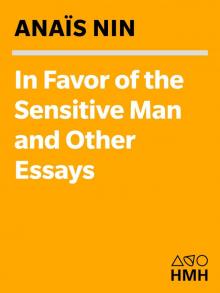 In Favor of the Sensitive Man and Other Essays (Original Harvest Book; Hb333)
In Favor of the Sensitive Man and Other Essays (Original Harvest Book; Hb333)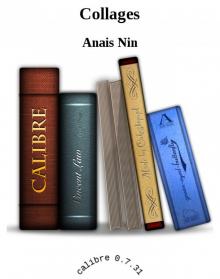 Collages
Collages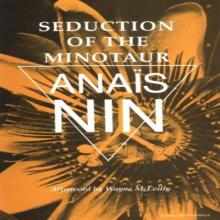 Seduction of the Minotaur
Seduction of the Minotaur Children of the Albatross
Children of the Albatross Delta of Venus
Delta of Venus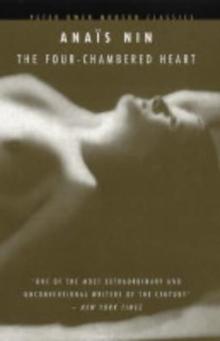 The Four-Chambered Heart coti-3
The Four-Chambered Heart coti-3 Diary of Anais Nin, Volume 2
Diary of Anais Nin, Volume 2 Diary of Anais Nin, Volume 1
Diary of Anais Nin, Volume 1 Diary of Anais Nin, Volume 4
Diary of Anais Nin, Volume 4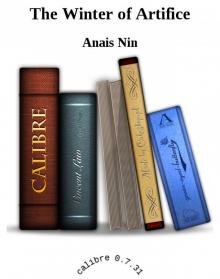 The Winter of Artifice
The Winter of Artifice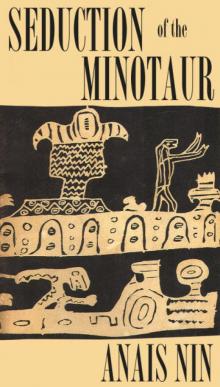 Seduction of the Minotaur coti-5
Seduction of the Minotaur coti-5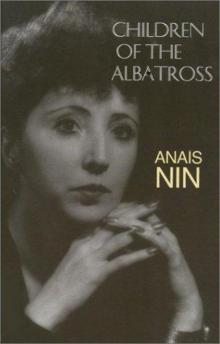 Children of the Albatross coti-2
Children of the Albatross coti-2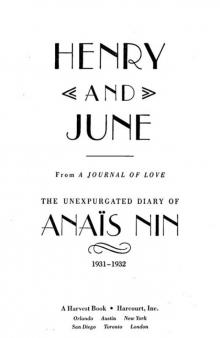 Henry and June: From A Journal of Love -The Unexpurgated Diary of Anaïs Nin (1931-1932)
Henry and June: From A Journal of Love -The Unexpurgated Diary of Anaïs Nin (1931-1932) Ladders to Fire
Ladders to Fire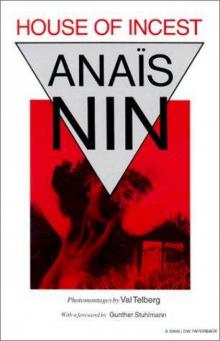 House of Incest
House of Incest